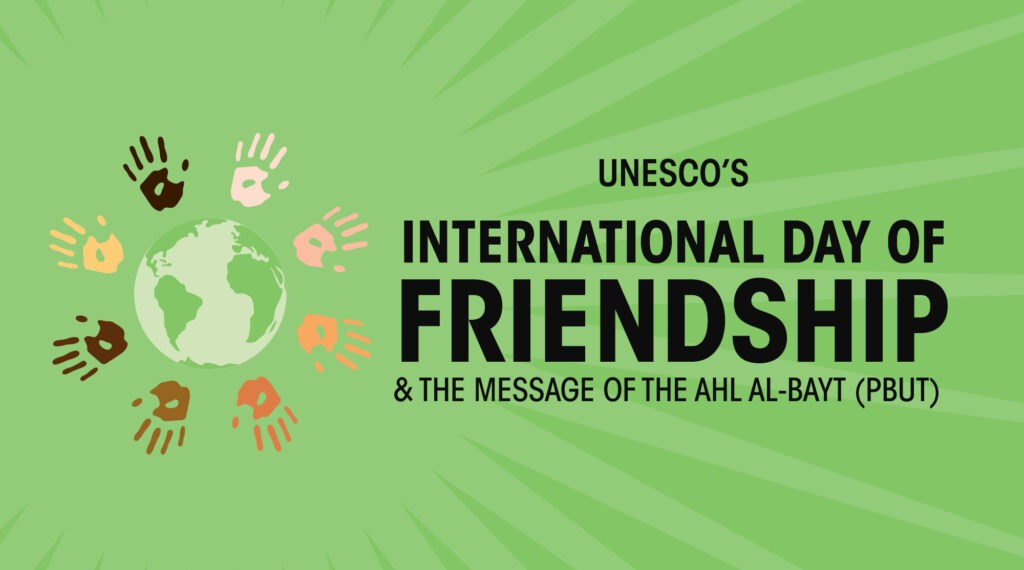UNESCO’s International Day of Friendship and the Message of the Ahl al-Bayt (pbut)

July 30, 2024, marks The International Day of Friendship, which was proclaimed in 2011 by the UN General Assembly to promote friendship between peoples, countries, cultures, and individuals. The goal is to inspire peace efforts and build bridges between communities.
The resolution aspires to elevate younger generations to positions of leadership in their communities in the near future. They are to then establish activities that are inclusive of different cultures and that promote an international understanding and respect for diversity.
The International Day of Friendship is an initiative that follows up on the proposal made by UNESCO defining the Culture of Peace as a set of values, attitudes, and behaviors that reject violence and endeavor to prevent conflicts by addressing their root causes with an eye toward solving problems. It was then adopted by the UN General Assembly in 1997.
How friendship translates to greater human rights globally
In the face of poverty, violence, and human rights abuses across the globe, world leaders can establish a spirit of collaboration and achieve peace, security, and social harmony through solidarity, specifically in the form of friendship. These bonds of camaraderie and strong ties of trust can produce fundamental shifts that result in greater stability and unified efforts around the greater good of humanity.
Islam and embracing friendship, human solidarity, and brotherhood
The teachings of Islam, the profound wisdom of the Quran, and the words of Prophet Muhammad (pbuh&hp) and the Ahl al-Bayt (p) sayings provide a rich foundation for the principles mentioned above. Here are some examples:
- The Quran emphasizes the unity and equality of all human beings. In Surah Al-Hujurat (49:13), it is stated, “O mankind, indeed We have created you from male and female and made you peoples and tribes that you may know one another. Indeed, the most noble of you in the sight of Allah is the most righteous of you. Indeed, God is Knowing and Acquainted.” This verse highlights the importance of understanding and knowing one another, transcending differences to build a cohesive and righteous community.
In the spirit of The International Day of Friendship, we are reminded of the necessity to foster friendships and cooperation for noble causes. The Quran advocates for working together towards righteousness and piety: “And cooperate in righteousness and piety, but do not cooperate in sin and aggression. And fear Allah; indeed, Allah is severe in penalty.” (Quran, 5:2)
- The Prophet Muhammad (pbuh&hp) stressed the importance of brotherhood and friendship among Muslims. He reportedly said, “None of you truly believes until he loves for his brother what he loves for himself” [Shaykh Kulayni, Al-Kafi, v. 2, hadith #330 and Shaykh Tusi, Tahdhib al-Ahkam, v. 6, p. 47]. This hadith underscores the significance of empathy, selflessness, and mutual respect in fostering strong relationships.
- Imam Ali (p), the first Imam of Shia Muslims, provided timeless advice on governance and human relations in his famous letter to Malik al-Ashtar, his governor in Egypt. Imam Ali (p) reportedly said:
“Remember, Malik, that among your subjects there are two kinds of people: those who have the same religion as you have, and they are brothers to you, and those who have religions other than yours, and yet they are human beings like you. Human beings either share your faith or they are your equals in creation” [Sharif Radi, Nahjul Balagha, letter #53].
This highlights the importance of treating every individual with respect and kindness, regardless of their faith, highlighting our shared humanity.
- Imam Jafar al-Sadiq (p), the sixth Imam of Shia Muslims, emphasized the value of friendship and brotherhood. He reportedly said, “Extend your love and friendship to your brother the same way you would like him to extend his love and friendship to you” [Shaykh Al-Kulayni, Al-Kafi, vl. 2, p. 644, Hadith #3].
- Imam Hasan al-Askari (p), the eleventh Imam of Shia Muslims, reportedly said, “The most pious among people is he who performs his duties towards others. The most equitable among people is he who likes for others what he likes for himself and dislikes for them what he dislikes for himself” [Ibn Shuba al-Harrani, Tuhaf al-Uqul, p. 489].
On the International Day of Friendship, let us commit to strengthening the bonds of friendship and solidarity. Let us work together for the betterment of society, inspired by the teachings of the Quran and the wisdom of Prophet Muhammad and Ahl al-Bayt (pbut). By doing so, we honor the spirit of friendship and uphold the values of compassion and unity.

Leave a Comment:
You must be logged in to post a comment.